2010 年广东成人学士学位英语考试真题
Part I Dialogue Completion (15 points)
Directions: There are 15 short incomplete dialogues in this part, each followed by
4 choices marked A, B, C and D. Choose the one that best completes the dialogue and
mark your answer on the ANSWER SHEET.
1. —— What day is it today?
—— _______________.
A. Monday B. It’s fine C. June 14 D. Nine o’clock
2. —— Excuse me. Can you tell me the time, please?
—— ____________.
A. Sure, please B. Thank you so much C. It’s six o’clock D. Yes, I can
3. —— May I use the telephone?
—— _____________.
A. Go ahead B. Thank you so much C. Don’t worry D. You are welcome
4. —— Would you like to come to the party Friday evening?
—— ______________.
A. That’s right B. Yes, I’d like to C. I’ll be late D. No, never mind
5. —— I’m sorry I can’t give you any help.
—— That’s OK. ____________.
A. What a pity B. I don’t care
C. Thank you all the same D. Don’t mention it
6. —— How did you find your visit to the museum, Eddie?
—— ____________.
�
A. I went there all by myself B. Oh, wonderful, indeed
C. My friend showed me there D. By taking a No. 2 bus.
7. —— I didn’t know this was a one-way street, sir.
—— ___________
A. It’s different. B. How do you do?
C. How dare you say that? D. Sorry, but that’s no excuse.
8. —— I don’t want to eat anything. I’m not feeling well today.
—— _____________, Carlos. I hope you’ll be better soon.
A. It doesn’t matter B. Don’t bother
C. I’m better now D. I’m sorry to hear that
9. —— Are you going to take part in the English contest to be held at the end of
this term?
—— ___________.
A. I’m afraid B. I do C. It depends D. It’s a pleasure
10. —— Today’s Sunday. What about going to the Science Museum?
—— __________.
A. Take it easy B. Let’s call it a day
C. That’s a good idea D. It’s kind of you to say so
11. —— I have just passed my exam. I feel so relieved now.
—— ____________!
A. Thank you B. Well done C. Cheer up D. My pleasure
12. —— Don’t forget to pass on the message to my teacher.
�
—— ___________.
A. Yes, I don’t B. I don’t think so C. No, I won’t D. Sorry, I wouldn’t
13. —— How could you say that?
—— _____________. I didn’t mean to hurt you.
A. It doesn’t matter B. That’s all right
C. I am really sorry D. None of your business
14. —— You have given us a wonderful party, Mrs. Johnson.
—— ____________.
A. Don’t say to B. I’m glad you enjoyed it
C. It is interesting for you to say so D. Oh, I’m afraid I didn’t organize it well
15. —— What’s the matter? You really look upset.
—— _____________.
—— Well, better luck next time.
A. I have won a prize B. I failed an important test
C. Why, I always look up to you D. Me? I never look down upon anybody
Part II Reading Comprehension (40 points)
Directions: There are 4 passages in this part. Each of the passages is followed by
5 questions or unfinished statements. For each of them there are 4 choices marked
A, B, C and D. Choose the best one and mark your answer on the ANSWER SHEET.
Passage One
We are all busy talking about and using the Internet, but how many of us know the
history of the Internet?
Many people are surprised when they find that the Internet was set up as recently
as the 1960s. At that time, computers were large and expensive. Computer networks
didn’t work well. If one computer in the network broke down, then the whole network
�
stopped. So a new network system had to be set up. It should be good enough to be
used by many different computers. If part of the network was not working, information
could be sen through another part. In this way the computer network system would
keep on working all the time.
At first the Internet was only used by the government, but in the 1970s, universities,
hospitals and banks began to use it, too. However, computers were still very
expensive and the Internet was difficult to use. At the beginning of the 1990s,
computers became cheaper and easier to use. And scientists developed software that
made Internet “surfing” more convenient.
Today it is easy to get online and it is said that millions of people use the Internet
every day.
16. The Internet was set up in _____________.
A. 1960 B. the 1960s C. 1970 D. the 1970s
17. Computer networks didn’t work well at first because ___________.
A. computers were large and expensive
B. computers couldn’t send information fast
C. computers didn’t fit into the same network
D. if one computer failed, the whole network stopped
18. Which of the following was the first to use the Internet?
A. Governments. B. Universities. C. Banks. D. Hospitals.
19. Which of the following statements is true?
A. People use the internet mainly to send emails.
B. Computers are now more costly then ever before.
C. Computers were costly and hard to use until the early 1990s.
D. In the 1970s the Internet was easy to use but computers were costly.
20. The best title for the passage is ____________.
�
A. The Future of the Internet B. The History of Computers
C. The history of the Internet D. Convenient Internet Surfing
Passage Two
Alan Chang was a handsome young man with good manners.
One morning he was walking along a street on his way to an appointment. He did not
want to be early or late. He had forgotten to put on his watch so he went up to a
man who was waiting for a taxi.
“Excuse me, sir,” he said, very politely, “but could you tell me the time?”
The man, who was very well-dressed and looked quite rich, said nothing. He did not
even look at Alan. Alan spoke to him again. “Excuse me, sir,” he said, “but could
you please tell me what time it is?”
This time the man looked at him, but he did not speak and looked quickly away. Alan
thought to himself: well, he can hear me; he must be just rude. So Alan asked again,
“Why wouldn’t you tell me the time, sir?”
The man turned towards him and said, “Put yourself in my shoes. I am standing here
waiting for a taxi. You come up to me and ask me for the time. If I tell it to you,
you will thank me. I will say ‘That’s all right.’ You may then say ‘It’s a beautiful
day,’ to which I may reply ‘Yes, I like these sunny winter days.’ Before we know
what is happening we have a friendly conversation. You are a pleasant, polite yo7ung
man, so when my taxi comes, I offer you a ride. You accept. We talk. I like you.
You like me. I invite you to my home. You meet my daughter. She is a very pretty
girl. You are a good-looking man. You like each other. Soon you fall in love. You
want to marry. Now do you understand my problem?”
Alan shook his head. “No, sir, I’m sorry, I don’t. Everything you have said seems
very natural to me.”
“Exactly,” the man said, “and I do not want my daughter to marry a man who is
too poor to buy a watch. Good morning to you.” And with these words he hurried away.
21. Why did Alan ask the man what time it was?
A. He was too late. B. He was very early.
C. He had left his watch home. D. He wanted to meet the man’s daughter.
�
22. What did Alan think of the man when he would not tell him the time?
A. He was impolite. B. He was deaf.
C. He was stupid. D. He spoke no English.
23. What did the man mean by the underlined part “Put yourself in my shoes”?
A. Don’t interrupt me. B. My shoes hurt me.
C. Come and try my shoes. D. Try to understand me.
24. What kind of a man was Alan Change in the man’s opinion?
A. thief. B. A poor man. C. A cheat. D. A rich man.
25. The story is mainly about ____________.
A. how rude a person can be B. how one thing leads to another
C. where a person can’t tell the time D. why you shouldn’t speak to strangers
Passage Three
What are the beauties of Hawaii? Let’s start with four.
The beach, famous for its water temperature, air temperature and waves, is the first
beauty. There are hundreds of miles of beaches on the twenty islands of Hawaii. They
are thought to be among the finest beaches in the world.
Then, what do you think would be the second beautiful thing? It is volcanoes (火
山), of course. These volcanoes are not just a part of the islands; they made the
islands in the first place. Because of them the islands are still growing.
What would be the third thing of beauty that the first visitor to Hawaii would notice?
It probably wouldn’t be just one thing, but many things: all the wonderful fruits
and flowers of the islands. Sugar cane, bananas and pineapples are Hawaii’s biggest
exports. Sugar cane has been growing in Hawaii for a thousand years. As for pineapples,
the islands produce more than any other places in the world, which has made Dole
Company the biggest fruit-packing company in the world.
The fourth and most beautiful thing about Hawaii is the people who live there. The
Hawaiians never rush, and perhaps this is because they care more for human life than
they care for the machine. There is an old Hawaiian law that a man can go to sleep
�
in the middle of the road if he wants to. What makes the people of Hawaii so beautiful
is their feeling about people. There are 64 different combinations of races on the
islands, and they all live in peace. They believe “Above all nations is humanity.”
That is the most beautiful thing of all.
26. According to the passage, Hawaii is made up of ___________.
A. one island B. twenty islands C. sixty-four islands D. hundreds of islands
27. Why are the volcanoes so special to the islands?
A. They are not a part of the islands. B. They actually made the islands.
C. They are the first in the world. D. They are growing.
28. What has made Dole Company the biggest fruit-packing company in the world?
A. Sugar. B. Sugar cane. C. Bananas. D. Pineapples.
29. The people in Hawaii are the most beautiful thing because ___________.
A. they had a peaceful history B. they can sleep in the middle of the road
C. there are 64 different races on the islands D. they care more for people than
anything else
30. According to the passage, “ above all nations is humanity ” might mean
___________.
A. not all nations have humanity B. humanity is as important as a nation
C. humanity has no national boundaries D. all human beings should live in peace
Passage Four
There is a measurable relation between how much a person learns and his attitude
toward the subject to be learned. When faced with a difficult learning task, one
path to success is to concentrate on the positive aspects of the subject matter.
If a student has a boring teacher, one solution is to look for the positive aspects
of completing the course, regardless of how boring the teacher happens to be. To
accomplish this might require a private tutor or some independent reading, but with
the right attitude, success is possible.
Over-achievers – students who do better than their test scores show – usually
�
have a positive interest toward learning. They may learn some things more slowly,
and they may make more efforts, but, to compensate (补偿), they are often better
at applying what they have learned. As long as they do not have emotional problems,
they are successful.
Under-achievers – those who function below their ability shown by test scored –
often tend to allow a few negative factors to affect them. Because of their negative
attitudes, they sometimes become unfairly critical of teachers. They allow
themselves to get bored when it is not necessary. In short, their attitudes often
cause them to learn less than over-achievers.
If you learn to replace a negative attitude toward learning with something more
positive, you are on the road to achieving almost any goal you desire. For example,
if you realize a personal computer with a word processor would improve your
performance, but have an attitude that keeps telling you that a computer is difficult
to operate, you tend to make all kinds of excuses. In short, you resist making full
use of a terrific tool, simply because your negative attitude prevents you from
learning.
31. What does the author think a student should do if he has a boring teacher?
A. Look for a new course. B. Be critical of the teacher.
C. Complete the course with a good score. D. Have a right attitude toward the teacher.
32. The writer thinks that over-achievers and under-achievers mainly differ in
___________.
A. their test scores B. their judgment of others
C. their attitudes toward learning D. their skills in using computers
33. The underlined phrase function below their ability shown by test scores means
the under-achievers _____________.
A. often get low scores in tests
B. do worse in actual learning than in tests
C. usually do better in tests than the over-achievers
D. are always slow in learning and have to make more efforts
34. The example of the personal computer shows that ___________.
�
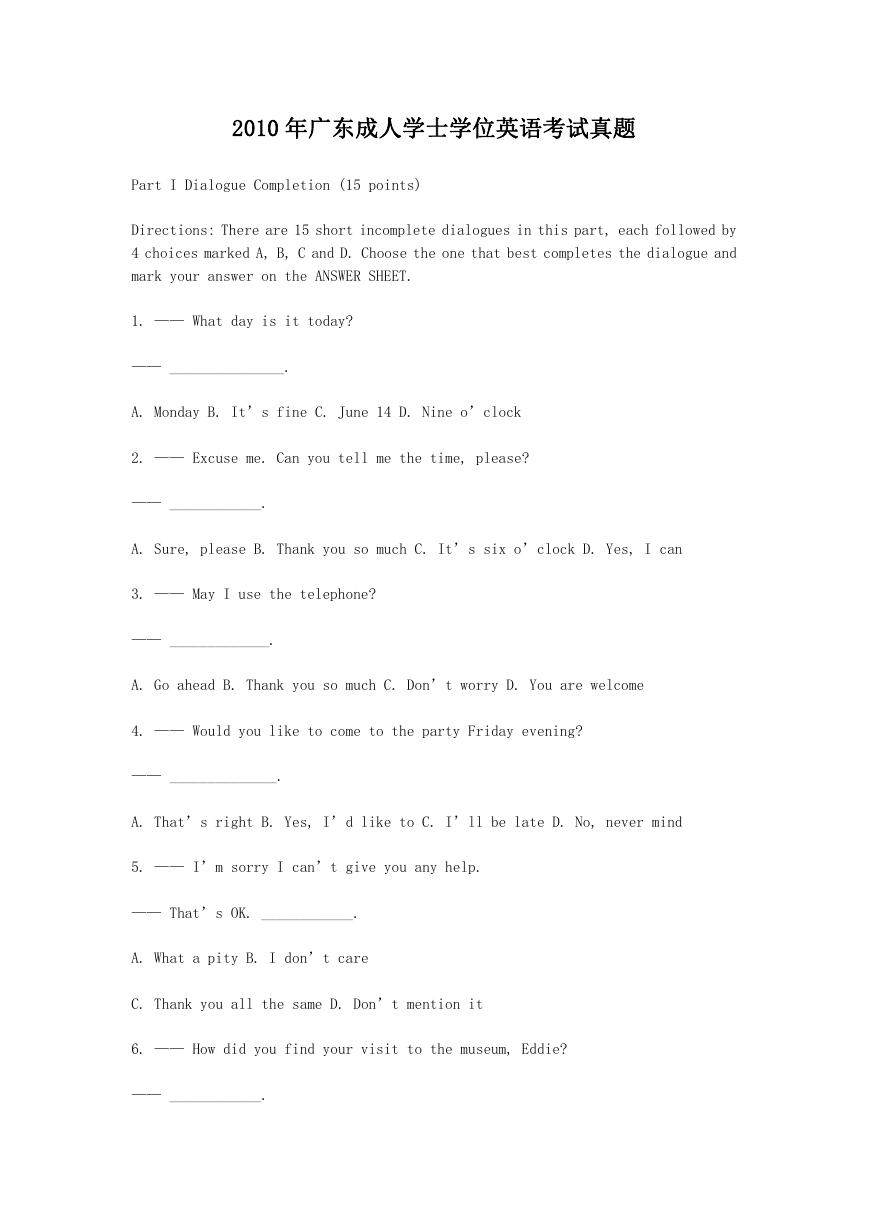
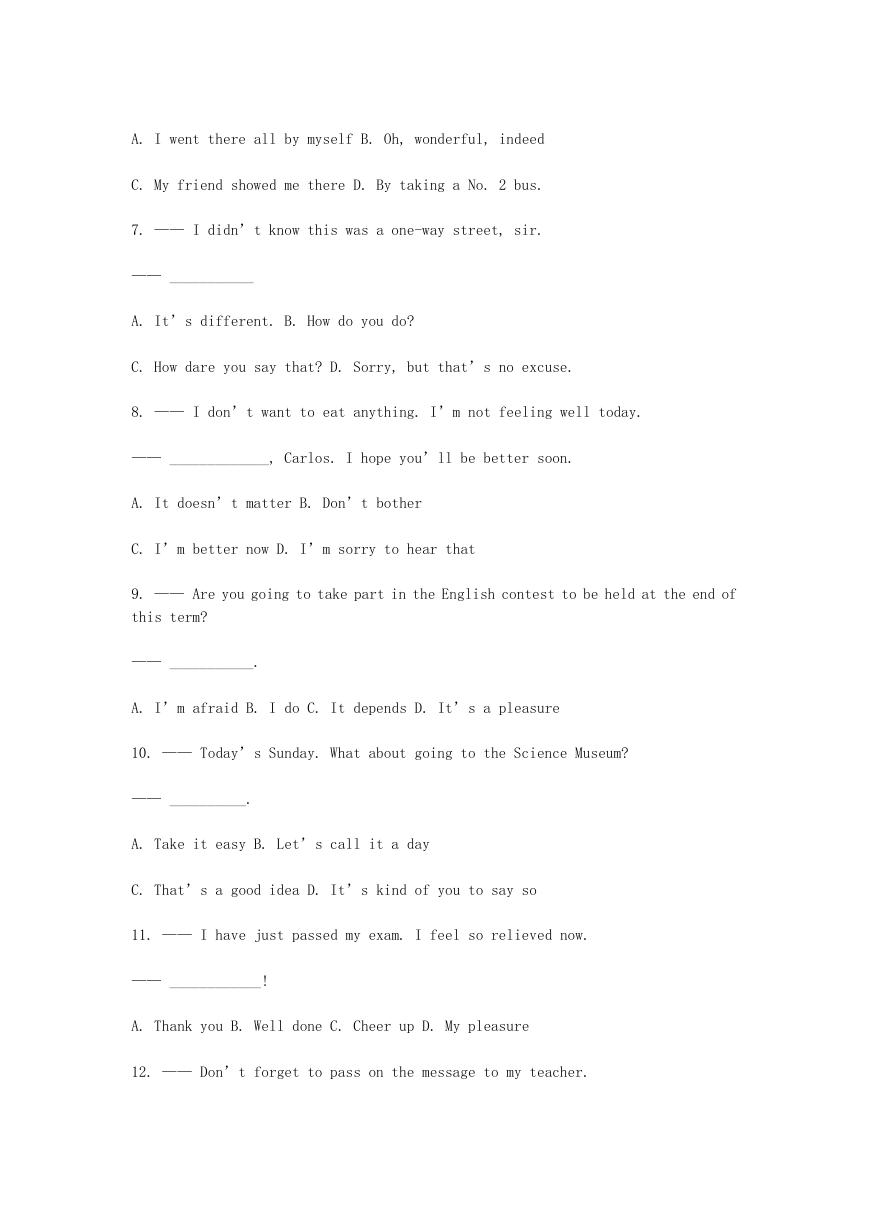
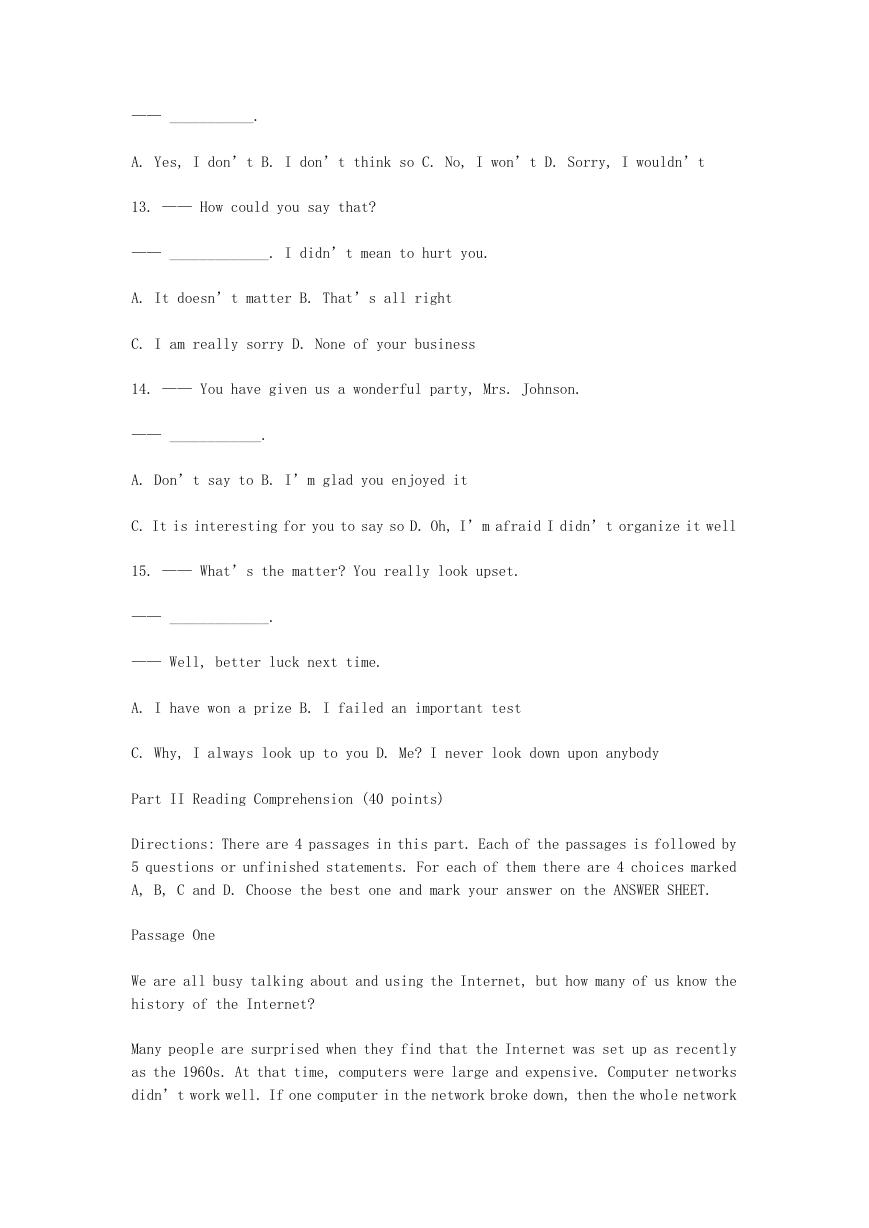
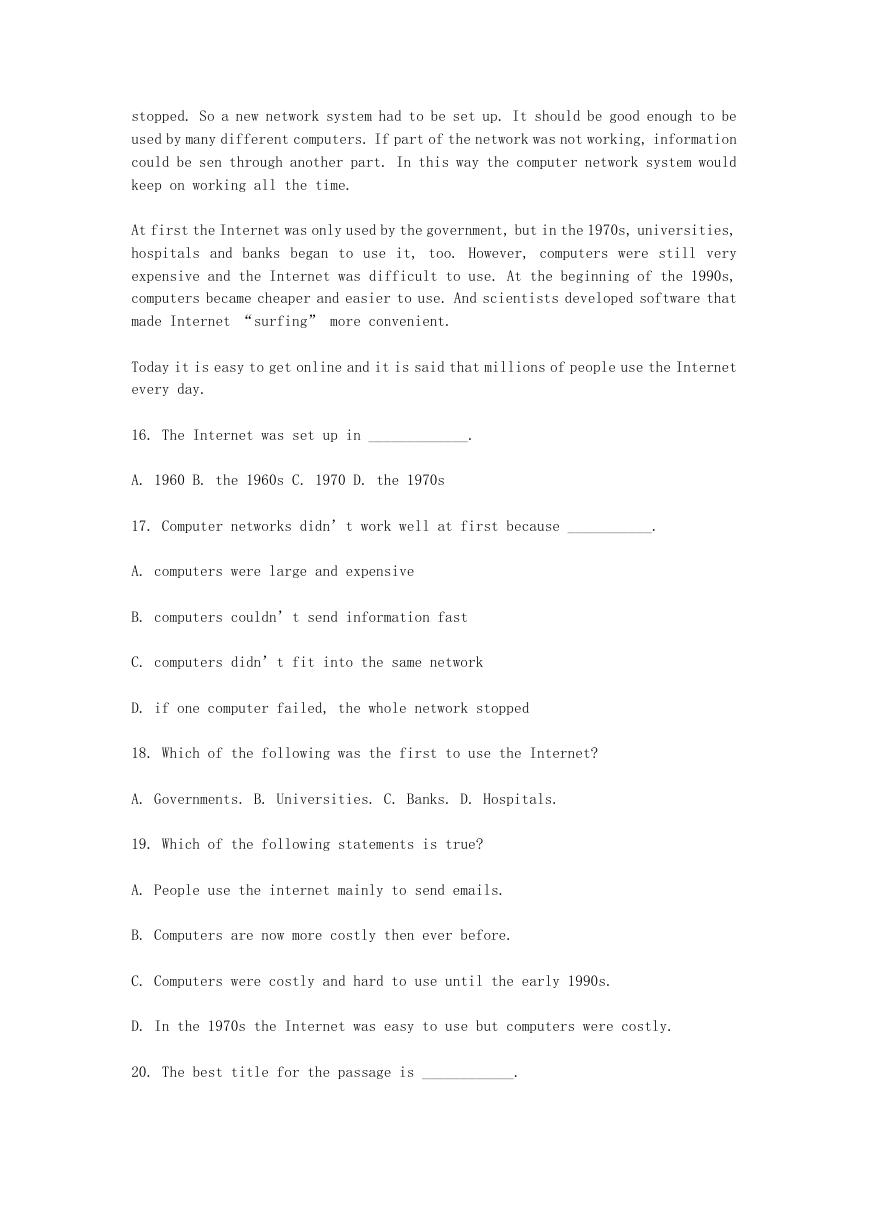
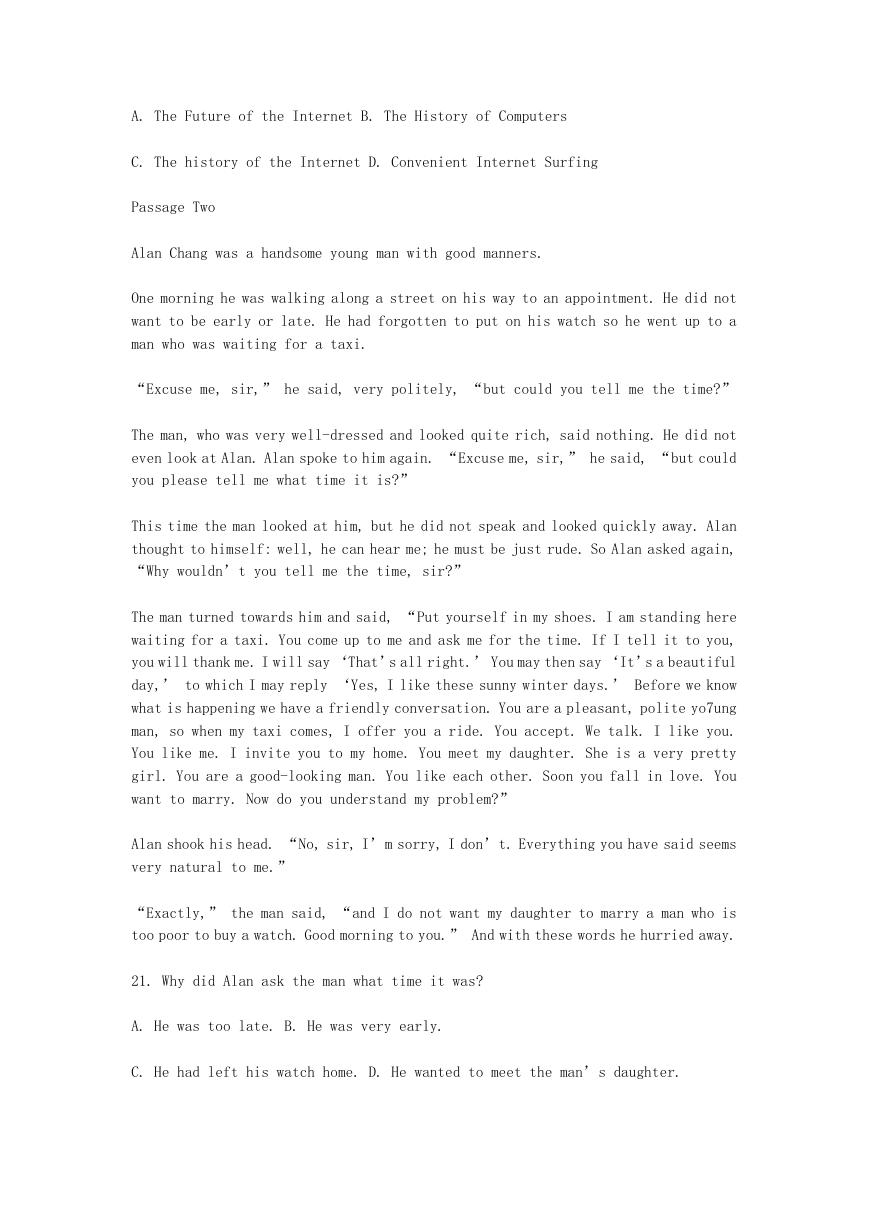
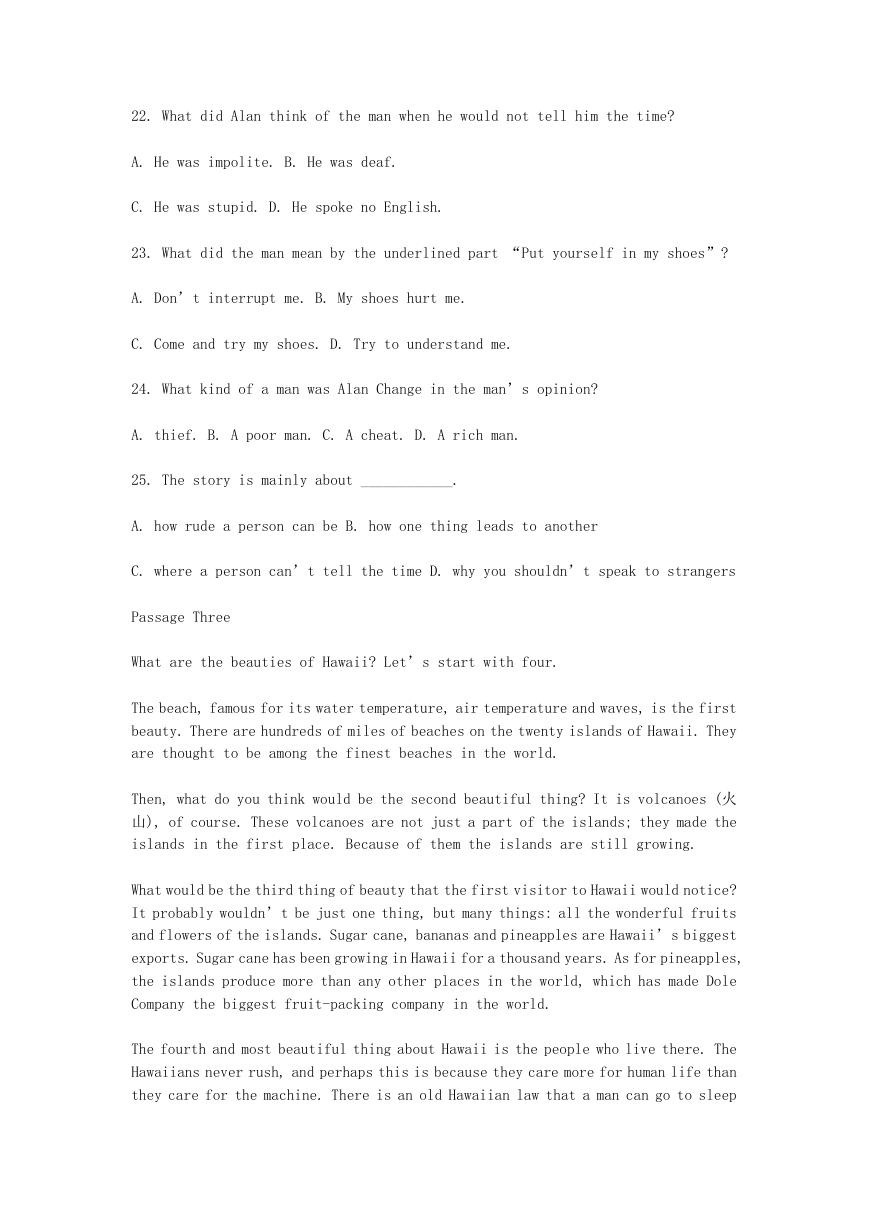
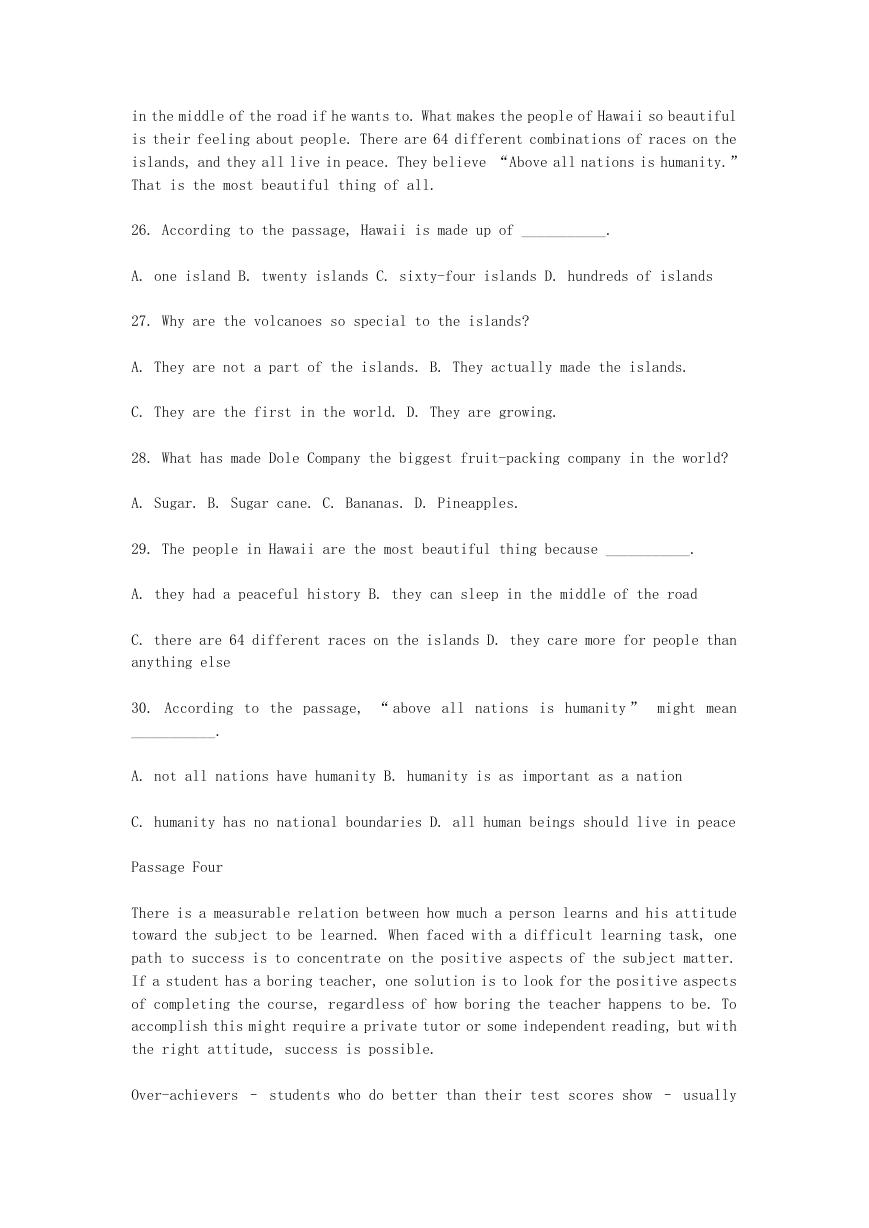
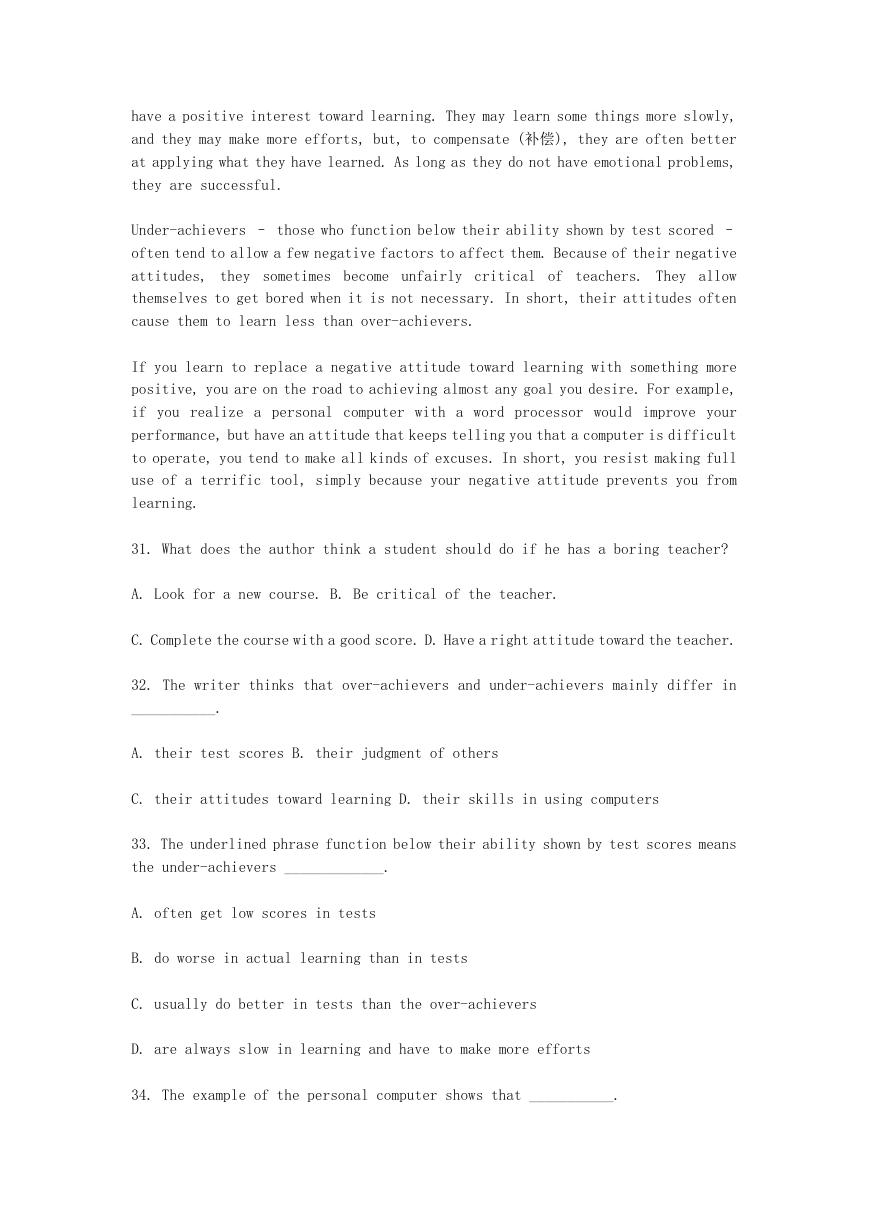








 2023年江西萍乡中考道德与法治真题及答案.doc
2023年江西萍乡中考道德与法治真题及答案.doc 2012年重庆南川中考生物真题及答案.doc
2012年重庆南川中考生物真题及答案.doc 2013年江西师范大学地理学综合及文艺理论基础考研真题.doc
2013年江西师范大学地理学综合及文艺理论基础考研真题.doc 2020年四川甘孜小升初语文真题及答案I卷.doc
2020年四川甘孜小升初语文真题及答案I卷.doc 2020年注册岩土工程师专业基础考试真题及答案.doc
2020年注册岩土工程师专业基础考试真题及答案.doc 2023-2024学年福建省厦门市九年级上学期数学月考试题及答案.doc
2023-2024学年福建省厦门市九年级上学期数学月考试题及答案.doc 2021-2022学年辽宁省沈阳市大东区九年级上学期语文期末试题及答案.doc
2021-2022学年辽宁省沈阳市大东区九年级上学期语文期末试题及答案.doc 2022-2023学年北京东城区初三第一学期物理期末试卷及答案.doc
2022-2023学年北京东城区初三第一学期物理期末试卷及答案.doc 2018上半年江西教师资格初中地理学科知识与教学能力真题及答案.doc
2018上半年江西教师资格初中地理学科知识与教学能力真题及答案.doc 2012年河北国家公务员申论考试真题及答案-省级.doc
2012年河北国家公务员申论考试真题及答案-省级.doc 2020-2021学年江苏省扬州市江都区邵樊片九年级上学期数学第一次质量检测试题及答案.doc
2020-2021学年江苏省扬州市江都区邵樊片九年级上学期数学第一次质量检测试题及答案.doc 2022下半年黑龙江教师资格证中学综合素质真题及答案.doc
2022下半年黑龙江教师资格证中学综合素质真题及答案.doc